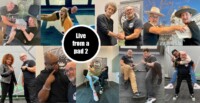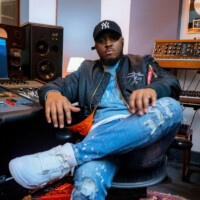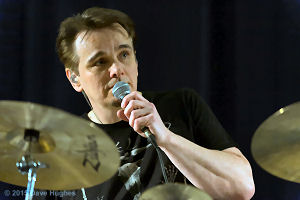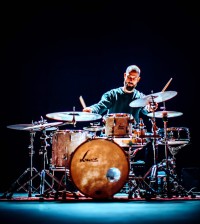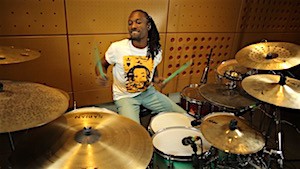 With one of most extensive CV’s in the country, Gareth Brown easily earns his place in the top 10 of UK session drummers. His work includes artists like Lily Allen, Pixie Lott, Rihanna, Kelly Rowland, Jazmine Sullivan, The Specials, Blue, Tiziano Ferro, Mica Paris, Will Young, The Light House Family, Lorenzo Jovanotti, Shirley Bassey, Donna Summer, Sister Sledge, Lemar, Anastasia, Lulu, Rita Ora, Westlife and Joss Stone. And yes, this is actually a pretty stripped down version of his CV.
With one of most extensive CV’s in the country, Gareth Brown easily earns his place in the top 10 of UK session drummers. His work includes artists like Lily Allen, Pixie Lott, Rihanna, Kelly Rowland, Jazmine Sullivan, The Specials, Blue, Tiziano Ferro, Mica Paris, Will Young, The Light House Family, Lorenzo Jovanotti, Shirley Bassey, Donna Summer, Sister Sledge, Lemar, Anastasia, Lulu, Rita Ora, Westlife and Joss Stone. And yes, this is actually a pretty stripped down version of his CV.
Currently he’s not only the touring drummer for soul/pop queen Paloma Faith but also works as a MD, a fixer, a drum tutor, has just designed his own drumsticks and T-shirts and also owns a catering company on the side.
I caught up with Gareth in London to chat about his upbringing, his work as a drummer and MD and about his chef’s whites.
You started playing drums at the age of 12? How did it all start?
Yeah, well my father played the guitar and he played in church a lot. I copied him with my box guitar and my fake amp on stage that I plugged into. Later I moved on to keyboards, around the age of nine or ten. My cousin Howard (who now plays for Wycliff) played the drums and I just thought that’s way cooler, so I switched to drums.
My aunt, Charmain, was one of the song/praise and worship leaders and also the choir director. She was very influential and kept pushing me forward. I was still quite young and just wanted to play and be on stage.
Church is just the best upbringing for drummers because you get to play every style but you don’t know what it is. It’s just church to you. When you come out into a different arena you realise that this song by sister so-and-so is actually in 6/8. You don’t know about 6/8 but you’re comfortable playing it because you know the song.
It’s also great for discipline and if you’re playing behind a 25 piece choir, you’ve got to have strength and dynamics. These are just some of things church gives you naturally without even realising it.
Both your parents are Jamaican. Did that background influence your musical upbringing?
Yeah, well everyone loves Bob Marley. Not so much reggae though as my father was a minister, but later in life you kind of seek out your own path. But yes, there was reggae in the house, there was country in the house, blues, jazz and much more. I personally really like to play reggae. I like the feel of a one-drop, the snare rim shot coming down with the bass drum, that feeling is great. Also all the different styles of reggae. Not all reggae is swung; to get the “bubble” you have to play straight. It’s fun paying attention to that.
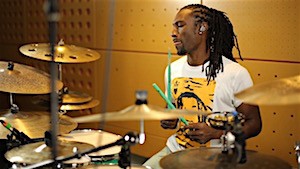 Was becoming a drummer a conscious career choice for you or did you just slip into it?
Was becoming a drummer a conscious career choice for you or did you just slip into it?
It was definitely my decision. I still went onto college and did a computer studies course, studied physics and maths but I always knew that this was going to be my career path. That same yearning, like I always knew there was more, that was the vibe I took and so I moved from Birmingham to London.
Your first pro gig was ‘Nine Yards’?
Yes. I moved to London when I was about 19/20 and stayed at my aunts. The deal was that I was the babysitter during the day when she was at Uni and in the evening I would just go to all the jam sessions around London. That was a real ‘Wow!’ moment. Back in Birmingham you get a little piece, especially when an American artist comes to town, but living in London I was able to see that quality of musicianship every night.
I heard about the audition and just went for it. It was my first audition ever so I had no idea what to do. I played the track they wanted but I didn’t feel like it was enough. I thought I had so much more to give so I just ended up playing every genre that I knew how to play. [laughs] They just had to give me the gig.
Where did it go from there?
Nine Yards was my first touring situation. We toured with The Brand New Heavies and Frankie Beverly & Maze – that’s where I met Teddy Campbell for the first time.
At that time I was still going back and forth to Birmingham doing my jazz and gospel gigs there. I did a gig for a lady called Rose Anderson and after that her MD called me to play for a boyband called Damage. The bass player in Damage, Velroy Bailey (very influential in my career – he actually plays drums as well), was an MD in his own right and called me for Hear’Say. Then off the back of Hear’Say it just kind of went mental.
Directly afterwards I got Blue, then…. well I can’t remember the order but just one gig led to another. I mean, you just gotta do a good job, be a cool person, you gotta get on with the artist, the MD, the rest of the band and so on. It’s not that you watch your Ps and Qs to stay on the gig, you wanna just be a cool person anyway. People won’t book you if they don’t like you and they certainly won’t want to hang out with you on a tourbus for months in that case.
What was the biggest challenge as the gigs got bigger and you became busier?
I think the challenge that a lot of drummers will face is maintaining the energy of wanting to learn, trying new ideas, and practising. The busier you get and the more gigs you take on, the less practise time you have. Even though on a tour you have bags of time (if you use your time wisely) but it’s not time around your instrument. You can practise with just your sticks but you have to be really disciplined. Let’s say you’re on a tour in Holland for the first time, you might wanna go and see the city. You might only be there for one gig, so after you arrive you go sight-seeing instead of practising, you do soundcheck, do the gig and you’re off back home. You need to stay sharp and keep working on your playing.
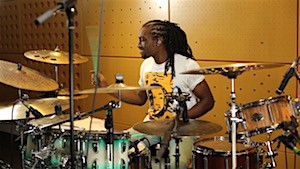 Looking back now, is there anything you wish you would have worked on more growing up?
Looking back now, is there anything you wish you would have worked on more growing up?
Yes, my doubles and rudiments. When I was growing up church wasn’t about gospel chops. Even the name ‘gospel chops’ – what is that? I understand what people mean when they say it, but my local church MD didn’t want that, so I was playing a lot of groove. As a result I think maybe 70-80% of the reason why people call me is for my groove and feel that I developed through church, not playing gospel chops. Thinking back though if I’d kept up my groove and practised more of my rudiments, doubles and muscle memory… I wish I’d done more of that.
Oh and definitely reading! I don’t know how many gigs I’ve missed out on. It would just open up a whole new world. I can read slowly, a bit like a toddler talking. [laughs]
You’ve played for so many different artists – sometimes multiple gigs at the same time. How do you learn all these songs and keep track across gigs?
I was lucky because some of the gigs I was the actual MD myself, so a lot of the arrangements and ideas were from myself which makes it easier to remember.
For other people I try to get in the MDs and the artists head. Trying to get their journey and their feeling. A lot of music is about the feeling, not just about the beats and rhythms, it’s the feeling of what their trying to say at the time and of the genre of music.
And then I obviously just listen to the songs over and over again and taking note of the bass drum pattern. Most of the songs in 4/4 are gonna have the snare drum on two and four so the bass drum and the hihat pattern are kind of giving the specifics.
In terms of learning arrangements I sort of see it as a map. We go from A to B, B back to A, then to C – it’s not rocket science. But when there is a lot music, you have to be clear.
Any favourite gigs you’ve worked on?
Oh man, there are different favourites for different reasons.
When working with Lilly Allen, that was at a time when I was really young and it was really cool working with such a big artist and to be headlining such massive festivals, American TV shows so on. The band was just a bunch of lads, all around the same age, going around the world doing what we love and getting paid for it. At that time it was more about the music and fun! The older you get the more the business becomes more serious. So yeah, the innocence of the Lilly Allen gig was really cool.
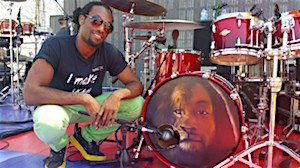 Then the vocal ability of people like Jazmine Sullivan or Mica Paris, they’re just belters! I remember Jazmine Sullivan flying over for rehearsals. She was tired, sat in the corner with her mic in her lap and absolutely killed it. Me and the rest of the band just couldn’t believe it.
Then the vocal ability of people like Jazmine Sullivan or Mica Paris, they’re just belters! I remember Jazmine Sullivan flying over for rehearsals. She was tired, sat in the corner with her mic in her lap and absolutely killed it. Me and the rest of the band just couldn’t believe it.
And Lorenzo Jovanotti needs to be mentioned because he’s such a massive but true artist. He knows exactly what he’s doing. He knows his audience, knows his musicians, how to manipulate a situation, knows about lighting and so on. You speak to the lighting crew they say Lorenzo should be a lighting designer, the stage crew say he should be a stage designer, the musicians say he would be a great MD. This guy just has it licked! It’s always such an honour that he calls me back.
What makes a great session player for you?
A great session player is somebody who can sound like the genres. People want to hear what they’re used to hearing for that type of music. Whether that’s rhythmically or sound-wise. Having a selection of drums and cymbals and knowing how to manipulate your drums and cymbals to sound like the genre the producer, the MD or the artist wants. That sounds easy but it’s not always. The only way around that is knowing the genres, listening to that type of music. It might sound boring but listening to country music is something you should do. It has a certain feel and sound about it and you won’t know how to play country music unless you listen to country music. If you’re saying you’re a session musicians and you want to do country sessions, that’s the only way.
Is there a noticeable difference for you working with UK artists compared to American artists?
Hmm, interesting question. I think the UK artists are a lot more chilled out and want it pretty much as the record whereas the Americans just want energy. They want performance sometimes more than music ability. Well, their musicians are so good they can have performance and musicality.
For example when I played for Kelly Rowland. I remember her coming in the room going: “Right, give me what you got! Impress me!”. She didn’t want to hear it played like the CD, she wanted something more. She wanted you to give part of your soul to the gig and a lot of the American gigs are like that. All the gospel-choppy gigs I’ve played have been American. Even comparing someone like Pixie Lott to Rita Ora, Rita had more of an American vibe just because she’s signed to an American label. Pixie was much closer to the CD. It’s just a different type of energy the Americans want.
In England your look is a massive thing. I didn’t get some gigs because I have dreadlocks, because I’m black or whatever it is. But equally I may have been considered because of my look. That is more of an issue, I think, in the UK.
You also work as a MD. What’s the main difference for you between being drummer/MD or ‘just’ drummer?
Yeah, I’m gigging as a musician, gigging as a MD and then sometimes I just MD the band and send them out.
Working in the different roles is very different. As the MD you can tell other people what to do and you can be late whenever you want. [laughs]
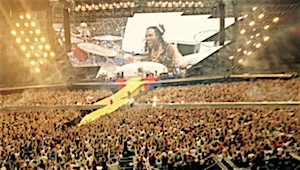 Being the MD is a lot of responsibility. You are that bridge between the artist and the band, between the management and the band, between the promoters and the band; and whatever comes out of the speakers for the punters to hear is your responsibility. Even telling the artist: “maybe you should sing this, maybe you shouldn’t sing that”. It’s a big responsibility!
Being the MD is a lot of responsibility. You are that bridge between the artist and the band, between the management and the band, between the promoters and the band; and whatever comes out of the speakers for the punters to hear is your responsibility. Even telling the artist: “maybe you should sing this, maybe you shouldn’t sing that”. It’s a big responsibility!
Being the drummer seems relatively easy. It’s a walk in the park because I already am a drummer, it’s what I love. There is no pressure on you. People just tell you what to do and where to be at what time.
But yeah, being drummer and MD is definitely the most challenging part. What tends to happen is that you think about everybody else, you think about the programming, the artist, can they hear alright, is their monitor ok…. and then you remember ‘Oh shoot, I have to play drums’! It’s very challenging, but doable. There are so many drummer MD’s out there and I really enjoy doing it. I love pushing the boundaries MDing, working on the arrangements, liaising with the artists and all this but I still love to play the drums.
As we mentioned you work as a ‘just’ MD and fixer too. What are you looking for in musicians?
The person has to be cool, no uptight people because it just can’t work.This industry is about ‘hurry up and wait’. “Hurry up, hurry up! Are you there yet? Ok, just wait two hours in the room over there.” If you’re not a cool person, it’s gonna come out.
I’m also definitely a believer in playing over looks. I want a player. I want somebody who knows their instrument, knows how to work their instrument: If you’re a guitarist or bassist know your pedals; if you’re a keys player know where your patches are, how to split your keyboard and how to layer sounds; if you’re a drummer know the difference between some swing and no swing (I find a lot of drummers swing responsibility is not right, they wanna swing everything), know about triggers, know how to cut samples I send you into your machine… those are the things I’m looking for.
And after all I’m looking for a performer. I love playing my instrument and I want to see that in people and feel that they are still excited by the whole thing.
You’re here today to record a promo video for your first signature drumsticks. That’s every drummers dream, isn’t it?
Yeah! I’ve been working with some Italian artists so a few Italian drum companies got in touch. VibeDrum for example made me my own custom snare, the GB. It’s Aluminium 14×12, so it’s on tom legs!
Of recent I’ve gone into partnership with another Italian company called Drum Art who are a proper artisan company specialising in snare drums and sticks. They asked me to become an endorsee and in the beginning I said no, I’m honestly so happy with Pearl, but the opportunity to creating something new with them came about. They invited me to their factory and showed how they make their sticks and explained the balance, the wood and this and that – and a couple of months later I’ve designed my own custom stick. It feels amazing to have somebody listening to your demands like that. It’s not just a stick from the shelf with my name on it, it’s a exactly my length, my weight, my dimensions and my balance point. It feels amazing to have your custom stick in your hand every day and to have that perfect tool for your job.
In addition to that we’re talking about possibly doing a ‘Gareth Brown’ snare drum line. That’s very exciting! I’m a very creative person. I like to keep things rolling and always think about what’s next. That’s why I’m finally working on my original music too now.
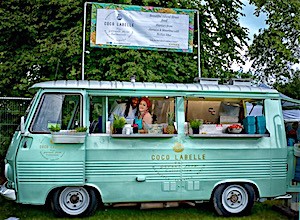 Tell me more about your original music project.
Tell me more about your original music project.
It’s a project called Jungle Green. I hope it comes across that I’m a very happy drummer and being one step behind the artist but situations have evolved and I’m all for taking opportunities from situations. So I’m creating my own music and I’ve got my own band that is semi-formed. I know who I want but everyone is busy It’s very very early so no commitments from anybody yet.
It’s pretty much reggae but throughout different genres like reggae fusion, reggae-jazz, reggae-rock. The track I’m recording today is very fusion and ‘muso’ sounding. Seeing as it’s a stick launch I think the drummers wanna hear some. Other songs could be more reggea-soul, so it might be a soul vibe harmony-wise on guitars and keyboards, but the backbeat might be a one-drop.
So yeah, it’s reggae with lots of different genres mixed together. I’m working towards an EP but life constantly takes over. We’ll see…
So for you this year has mainly consisted of touring with Paloma Faith?
Paloma, yes. Also the musicians from Paloma’s Band have put a band together called ‘The Faithettes’. We do a lot of corporate events just to keep us playing together.
I also play with a band called ‘Groovesonix’ with Paul Turner and Rob Harris (guitarist and bass player for Jamiroquai) and a great front singer called Shean Williams. Super funky band. We’ve been doing bits and pieces – a Robbie Williams support in front of 40.000 people for example. Amazing gig.
I’ve got some gigs with Eric Benet who’s an American R’n’B singer and possibly doing some things with Karyn White, an old school 90’s R’n’B singer. So yeah, various projects coming up.
Talking about many eggs in many baskets, you also founded a catering business?
Yes, food is a massive love of mine. I founded a company with my beautiful wife called ‘Coco LaBelle’ and we do a mixture of Jamaican, Mauritian and Sicilian food. With me being Jamaican and my wife being half Mauritian/half Italian it’s just food we cook at home and we know people love, and it has had a really good reception. With ‘Coco Labelle’ I’ve been on the other side of things doing lots of festivals. It was a bit strange because when we did Camp Bestival some of my friends from the Jess Glynne band came over checking me out with my chefs whites on.
I just think it’s important to have something else going on on the side. A good guy to check out for this is Nathan East (bass player). This guy is a multi-millionaire yet still pushing for gigs which shows he’s still hungry to play, cause he could retire easily. He’s got his own private plane, he has a baseball team – next level entrepreneurship!
But yeah, food is an extension of me and it’s also nice to have something else to do from time to time. I won’t lie though, sometimes I’m in the kitchen burning to play and end up practising paradiddles with the spoons.
Thanks a lot for your time Gareth!
Interview by Tobias Miorin
September 2016

